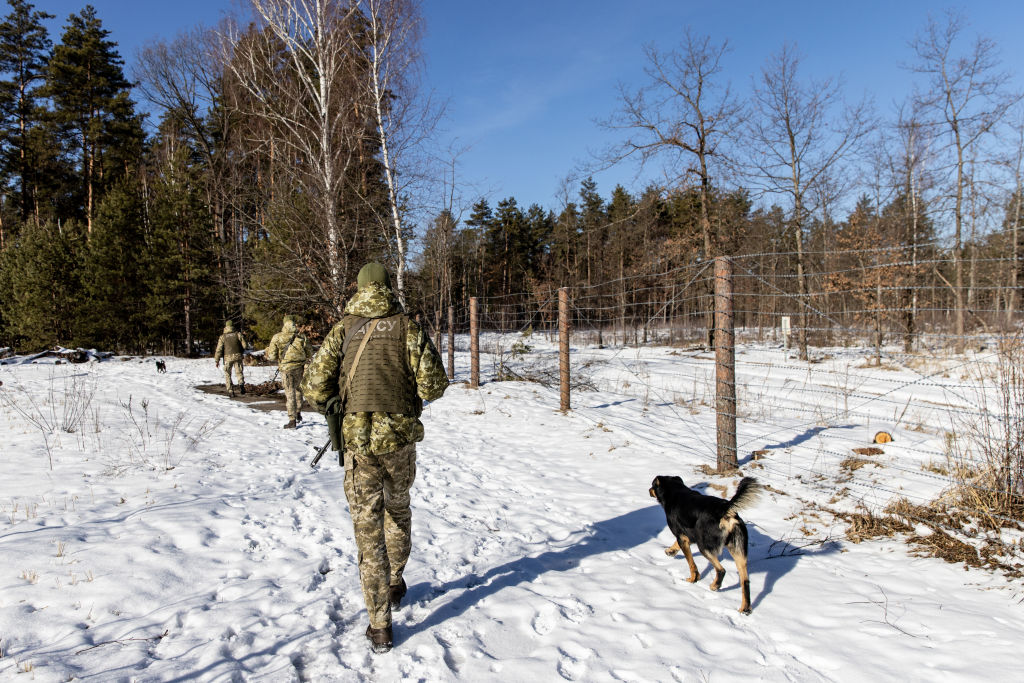NATO, Ukraine skeptical of Russia's partial troop withdrawal: 'We don't believe what we hear, we believe what we see'


A free daily email with the biggest news stories of the day – and the best features from TheWeek.com
You are now subscribed
Your newsletter sign-up was successful
Russia has begun returning troops stationed at the Ukrainian border to their bases, the Kremlin announced Tuesday, though both NATO and Ukrainian President Volodymyr Zelensky aren't entirely convinced, CNN and CNBC report.
Igor Konashenkov, spokesman for the Russian Ministry of Defense, said that Russian forces along the shared border with Ukraine had finished their military drills and "have already begun loading onto rail and road transport and will begin moving to their military garrisons today." He added that Russian troops in Belarus will return to base when their military exercises conclude on Feb. 20.
Other major drills will, however, continue, CNN notes.
The Week
Escape your echo chamber. Get the facts behind the news, plus analysis from multiple perspectives.

Sign up for The Week's Free Newsletters
From our morning news briefing to a weekly Good News Newsletter, get the best of The Week delivered directly to your inbox.
From our morning news briefing to a weekly Good News Newsletter, get the best of The Week delivered directly to your inbox.
That said, Ukrainian Foreign Minister Dmytro Kuleba isn't getting excited. "We in Ukraine have a rule: we don't believe what we hear, we believe what we see," he said in response to Moscow on Tuesday, per CNBC. "If a real withdrawal follows these statements, we will believe in the beginning of a real de-escalation."
NATO chief Jens Stoltenberg essentially agreed with Kuleba during a press conference Tuesday, noting that while there's reason for "cautious optimism," the alliance had not yet seen "any sign of de-escalation on the ground from the Russian side."
"Russia has amassed a fighting force in and around Ukraine unprecedented since the Cold War," Stoltenberg said. "Everything is in place for a new attack. But Russia still has time to step back from the brink, stop preparing for war and start working for a peaceful solution."
Moscow said Tuesday that it "had always said its troops would return to their bases after participating in military exercises," CNBC writes.
A free daily email with the biggest news stories of the day – and the best features from TheWeek.com
According to U.S. intelligence, a Kremlin-led invasion could come as soon as Wednesday. Zelensky, unconvinced, instead declared the day one of national unity.
Brigid Kennedy worked at The Week from 2021 to 2023 as a staff writer, junior editor and then story editor, with an interest in U.S. politics, the economy and the music industry.
-
 Switzerland could vote to cap its population
Switzerland could vote to cap its populationUnder the Radar Swiss People’s Party proposes referendum on radical anti-immigration measure to limit residents to 10 million
-
 Political cartoons for February 15
Political cartoons for February 15Cartoons Sunday's political cartoons include political ventriloquism, Europe in the middle, and more
-
 The broken water companies failing England and Wales
The broken water companies failing England and WalesExplainer With rising bills, deteriorating river health and a lack of investment, regulators face an uphill battle to stabilise the industry
-
 What is ‘Arctic Sentry’ and will it deter Russia and China?
What is ‘Arctic Sentry’ and will it deter Russia and China?Today’s Big Question Nato considers joint operation and intelligence sharing in Arctic region, in face of Trump’s threats to seize Greenland for ‘protection’
-
 What would a UK deployment to Ukraine look like?
What would a UK deployment to Ukraine look like?Today's Big Question Security agreement commits British and French forces in event of ceasefire
-
 Would Europe defend Greenland from US aggression?
Would Europe defend Greenland from US aggression?Today’s Big Question ‘Mildness’ of EU pushback against Trump provocation ‘illustrates the bind Europe finds itself in’
-
 Did Trump just end the US-Europe alliance?
Did Trump just end the US-Europe alliance?Today's Big Question New US national security policy drops ‘grenade’ on Europe and should serve as ‘the mother of all wake-up calls’
-
 Is conscription the answer to Europe’s security woes?
Is conscription the answer to Europe’s security woes?Today's Big Question How best to boost troop numbers to deal with Russian threat is ‘prompting fierce and soul-searching debates’
-
 Trump peace deal: an offer Zelenskyy can’t refuse?
Trump peace deal: an offer Zelenskyy can’t refuse?Today’s Big Question ‘Unpalatable’ US plan may strengthen embattled Ukrainian president at home
-
 Vladimir Putin’s ‘nuclear tsunami’ missile
Vladimir Putin’s ‘nuclear tsunami’ missileThe Explainer Russian president has boasted that there is no way to intercept the new weapon
-
 The Baltic ‘bog belt’ plan to protect Europe from Russia
The Baltic ‘bog belt’ plan to protect Europe from RussiaUnder the Radar Reviving lost wetland on Nato’s eastern flank would fuse ‘two European priorities that increasingly compete for attention and funding: defence and climate’
